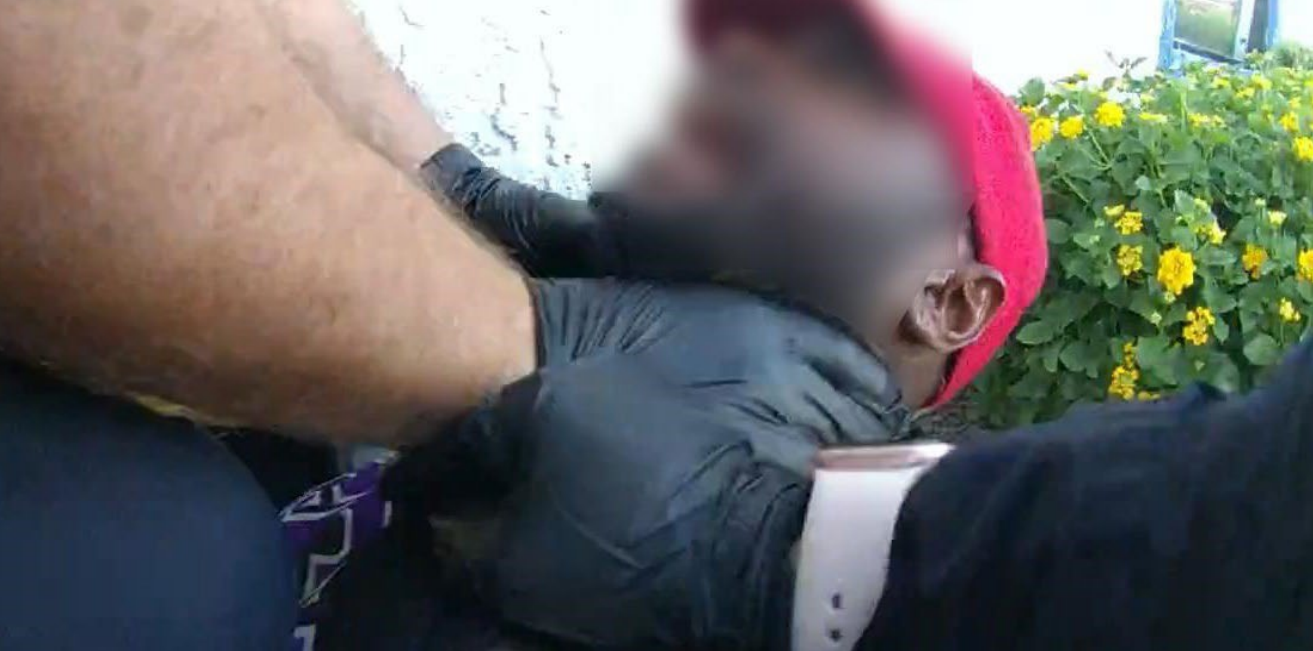
U.S. Justice Department

Audio By Carbonatix
For years, the Phoenix Police Department regularly committed a litany of civil rights violations, including discriminating against people of color, using excessive and unnecessarily deadly force and arresting unhoused people without cause, according to a long-awaited report by the U.S. Justice Department.
The 126-page report was released Thursday after the DOJ spent nearly three years investigating Phoenix police for its history of unconstitutional policing. The probe, which examined police behavior between 2016 and 2022, was conducted by the DOJ’s Civil Rights Division. In a virtual press conference Thursday morning, Assistant U.S. Attorney General Kristen Clarke summarized the department’s conclusions.
“Our findings today reveal very significant and severe violations of federal law and the Constitution,” said Clarke, who leads the Civil Rights Division. “We are prepared to do the hard work to address these reforms because the people of Phoenix deserve fair, nondiscriminatory and constitutional policing.”
The report found five major systemic constitutional violations:
- The use of excessive force, including unjustified deadly force
- The unlawful detention, citation and arrest of people experiencing homelessness, and the unlawful disposal of their belongings
- Discrimination against Black, Hispanic and Native American people
- Free speech violations
- Discrimination against people with behavioral health disabilities
Additionally, the DOJ found that the police department fails to accept and thoroughly investigate complaints of officer misconduct and does not adequately discipline offers who engage in misconduct. The department also has poor policies and deficient training that the DOJ found contributes to its systemic constitutional violations.
Clarke said the DOJ will continue to have conversations with the city about possible reforms, leaving open the possibility of seeking a court-ordered consent decree that would subject Phoenix police to independent monitoring. The city has resisted the notion that a consent decree is required.

Assistant U.S. Attorney General Kristen Clarke, who leads the Justice Department’s Civil Rights Division, shared the findings of the department’s investigation into the Phoenix Police Department in a virtual press conference Thursday.
Screenshot via Zoom
Excessive force
The department shot and killed people at one of the highest rates in the country in the years before the investigation began, a significant number of which the DOJ said did not meet constitutional standards.
From 2018 to 2023, the department had one of the highest rates of fatal shootings among major cities across the country. During that time, there were 74 fatal shootings. Police shot and killed 12 people in 2023 and have shot and killed eight so far this year.
The department taught officers tactics that were “dangerous, unnecessary and unreasonable,” the DOJ said, including that all force – even deadly force – would lead to de-escalation. One police official told the DOJ that this distorted view was “ingrained in the vernacular of the department.”
The DOJ found that officers fired their weapons at people who presented no immediate threat and shot when their own “reckless tactics” magnified their own risk. Additionally, officers improperly used choking tactics, including on people who had not committed a crime.
Officers also unreasonably delayed rendering aid to people they shot and used force against people who were already incapacitated. Once, the DOJ said, cops shot a woman 10 times and waited nine minutes to approach her immobile body. She died of her injuries.
Those issues were exacerbated by poor training, the DOJ said. Phoenix police training explicitly encouraged officers to use immediate and indiscriminate force even when there was no legal justification to do so. In training sessions observed by investigators, instructors directed officers to use force without warning or just seconds after arriving at a scene – sometimes “before even trying to speak to a person,” the report said – regardless of whether or not any threat was present.
The report found police fired tasers at people with little or no warning, including at people who had surrendered, had their hands up or were physically restrained. Police also failed to maintain reasonable control over K-9s, with one dog biting the arm of an unarmed homeless man for 47 seconds, 30 of which were after officers had handcuffed the man.
The department also lacked meaningful practices to properly review use-of-force incidents. In both 2021 and 2022, the DOJ found, Phoenix police determined more than 98% of force incidents complied with department policy.

The Justice Department found that Phoenix police routinely stop and arrest unhoused people without probable cause.
Katya Schwenk
Violating rights of unhoused people
For the first time in the DOJ’s history, Clarke said, it found Phoenix police routinely violated the rights of the city’s large unhoused population, arresting unhoused people and destroying their property without cause.
From 2016 to 2022, the DOJ’s report said, 37% of those arrested by Phoenix police were people experiencing homelessness, even though fewer than 1% of Phoenix residents are unhoused. The DOJ said many of those arrests were unconstitutional.
In 2022, a federal court ordered the city to stop enforcing laws that criminalized homelessness. However, the DOJ said, Phoenix police “did not train officers how to follow the law nor supervise them to ensure they did.”
In general, the report found that the agency’s approach to policing unhoused people violates the Constitution’s ban on unreasonable search and seizure. Officers often stopped and investigated unhoused people without reasonable suspicion and detained or cited them without a lawful basis. The city and Phoenix police also seized and destroyed the personal property of unhoused people without due process.
Advocates for the unhoused say police have continued the illegal practice of arresting the unhoused and disposing of their belongings.
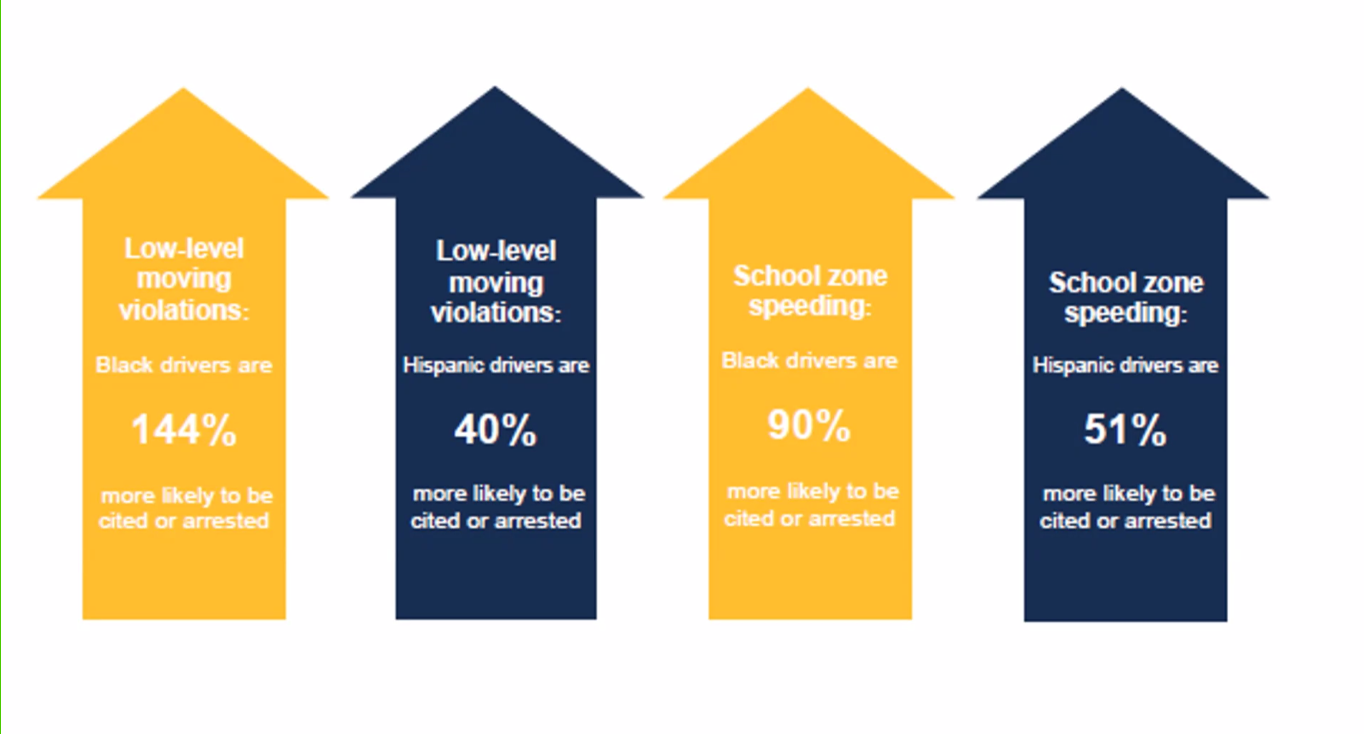
Phoenix police have a long track record of discriminatory policing, the Justice Department found, and lacks the tools to identify bias in its own policing.
U.S. Justice Department
Racial discrimination
The DOJ said Phoenix police disproportionately cited and arrested Black, Hispanic and Native American people compared with white people, violating the Civil Rights Act of 1964 and the Safe Streets Act.
Those arrests included the enforcement of alcohol and low-level drug offenses. Both Black and Hispanic people were significantly more likely to be cited for such offenses compared with white people. Native Americans were 44 times more likely to be arrested for consuming alcohol than white people.
The same bias appeared in the department’s traffic stops. Black people comprise 7.4% of Phoenix’s population but are arrested or cited three times as often as white people for traffic-equipment-related offenses. Hispanic people also disproportionally face citations or arrests for traffic violations.
Officers also cited or arrested cyclists for biking on the wrong side of the road almost eight times more often in predominantly non-white neighborhoods than in predominantly white neighborhoods. As recently as May 28, Phoenix police shot and killed a Hispanic man after stopping him for not having lights on his bicycle.
The DOJ said its statistical analysis validated “long-standing community criticism that officers use race and national origin as a factor in their traffic enforcement.” Despite those concerns, the DOJ noted, Phoenix police told investigators they were “unaware of any credible evidence of discriminatory policing.”
The report also found that the department lacks adequate internal policies, whether through data review or misconduct investigations, to detect patterns of discriminatory policing. Between Jan. 1, 2016, and April 1, 2022, the DOJ said, Phoenix police completed only two misconduct investigations into allegations of bias or racial profiling.
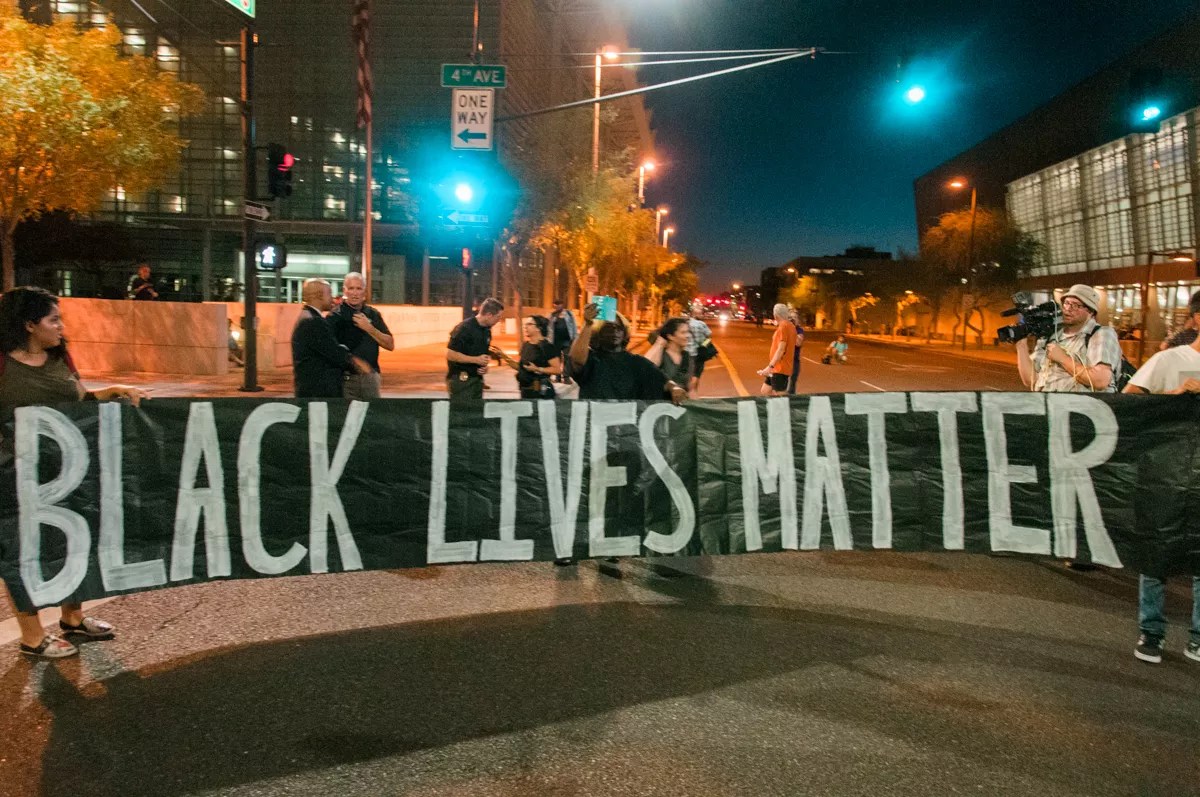
The Justice Department found a pattern of Phoenix police officers using force and arrests to trample free speech during the summer of 2020.
Ash Ponders
Free speech violations
The DOJ said police used indiscriminate force against protesters to deter free speech, falsified allegations to arrest protest leaders and retaliated against people critical of the police.
Many of the incidents the DOJ cited occurred during the summer of 2020, when protests over police brutality roiled the city’s streets. In that time, the DOJ said, cops often failed to warn protesters about shooting projectiles, such as stun bags and PepperBalls, and used excessive force on protesters who were not a threat.
One man was shot by PepperBalls in the back “even as he bicycled away in the direction officers had ordered him to go,” the report said. Another officer shot PepperBalls toward cars driving away from a gas station, “one of many instances we observed of officers shooting less-lethal projectiles in the direction of cars and people without warning.” During the protests, Phoenix police also unloaded projectiles on protesters after trapping them in a confined space.
The report also found that the department used arrests to discourage peaceful protesters – including, the report said, a family that “drove downtown to show support for the police” – with an official policy to “incarcerate as many individuals as possible” to handle civil unrest. Many charges police sought were far more serious than the evidence supported, according to the report.
Police also fabricated evidence to justify serious charges, including labeling a small group of protesters as members of a criminal street gang that was as dangerous as the Bloods or the Crips. The judge handling the case called the claims “false, misleading and inflammatory.”
Free speech violations were not confined to protests. In routine encounters, Phoenix cops unlawfully arrested or used force against people who were critical of police.
“People have the right to verbally criticize law enforcement officers so long as they do not actively interfere with the officers’ lawful duties,” the report said. It added, “Officers also demonstrate in their incident reports that they do not consider insults and verbal challenges to be protected speech.”
Officers also retaliated against people exercising their right to film police officers. One man who leaned out of his car window to film officers found himself held at gunpoint “from less than a foot away, then booked for felony rioting.” Prosecutors rejected the charges.
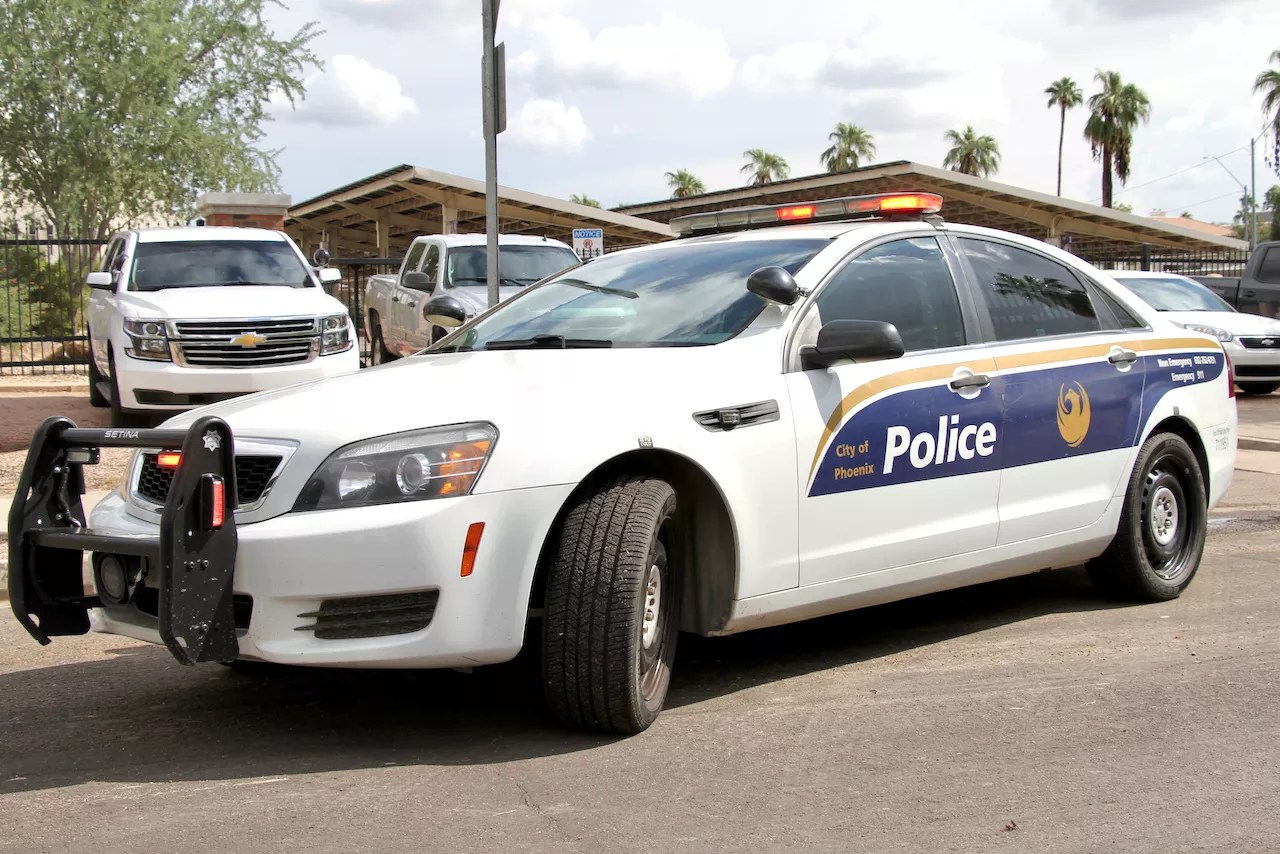
Though Phoenix police have access to behavioral health resources when responding to calls, the Justice Department found that 911 dispatchers rarely connect officers with those resources.
Matt Hennie
Violating the Americans with Disabilities Act
Phoenix police also discriminated against people with behavioral health disabilities.
The DOJ said that the agency’s 911 call center often fails to identify when callers need help with behavioral health issues, which accounts for about 10% of calls according to a 2021 study from Arizona State University. As a result, regular officers are dispatched instead of specially trained teams. Officers also have access to assistance from behavioral health responders but rarely take advantage of it.
In those encounters, the DOJ said, Phoenix cops adopt a “force first” mentality that makes situations worse. “For example,” the report said, “an officer fired PepperBalls less than two minutes after responding to a call regarding a man at a behavioral health center, rather than requesting help from a mobile crisis team or a clinician at the center.”
The DOJ also said officers escalated interactions with children, especially those who had behavioral health disabilities, and often defaulted to aggressive tactics.
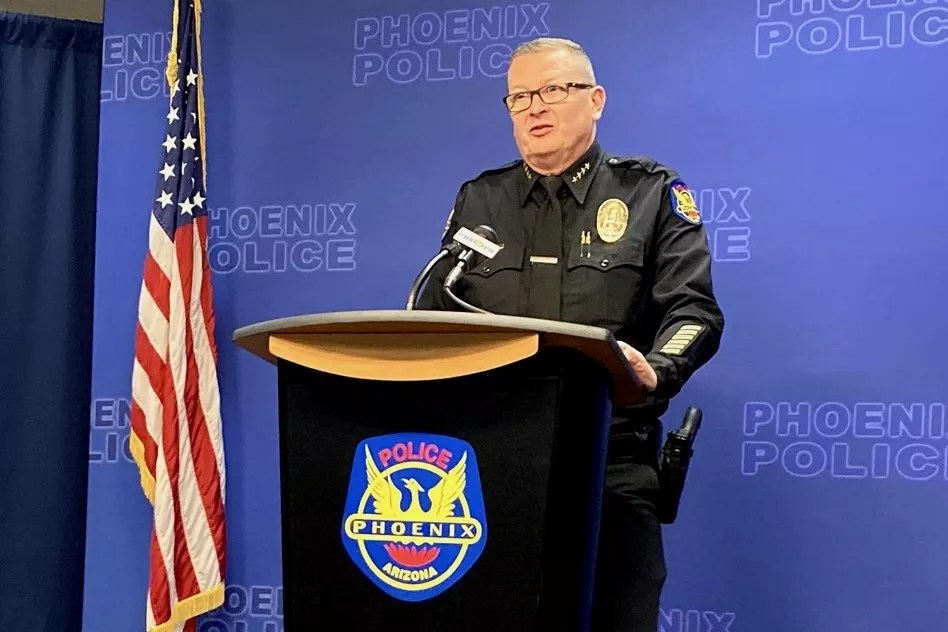
Phoenix police Chief Michael Sullivan said in December that his department would be able to implement reforms most effectively without independent oversight.
Stephen Lemons
Oversight inbound?
Based on their behavior in January, city officials seemed to understand that the report was going to be damning.
In a letter to the DOJ that month, the city said it planned to reject signing a consent decree, or an agreement with federal officials to be held accountable and make reforms through independent oversight. Police Chief Michael Sullivan also told reporters on Dec. 18 that the department could implement its reforms more effectively without the oversight of a judge or independent auditor.
But the resignation in 2024 of the head of Phoenix’s Office of Accountability and Transparency and the creation of a watered-down civilian review board call into question the city’s ability to regulate its own police department.
Clarke did highlight reforms Phoenix police already have undertaken, including revised use-of-force guidelines and employing more resources to respond to behavioral health calls. But she strongly asserted that independent oversight is a necessity.
“This is one instance where we can’t count on the police to police themselves,” Clarke said.
Clarke added that the DOJ will engage with city officials earnestly and swiftly but noted that “a consent decree has been the vehicle that has helped institute the reforms necessary to address the kind of serious violations set forth in this report today.” If the city won’t negotiate a consent decree, Clarke said litigation against the city is an option the DOJ can explore.
After the report’s release, Phoenix Mayor Kate Gallego said in a statement that the City Council will meet on June 25 in an executive session, which is closed to the public, “to receive legal advice, better understand the report and discuss next steps”
“I will carefully and thoroughly review the findings,” Gallego added, “before making further comment.”